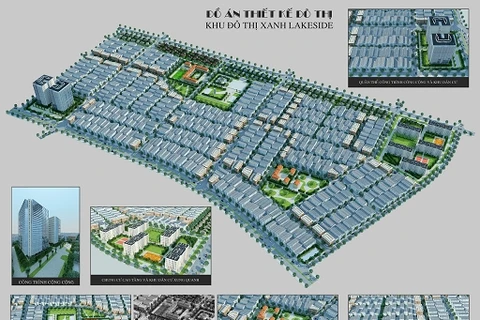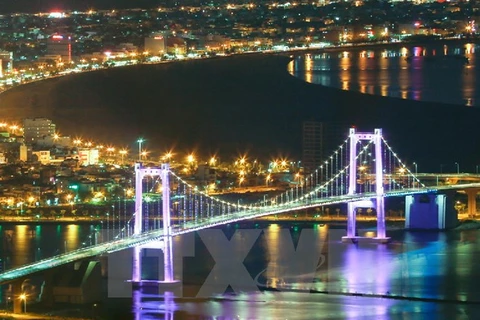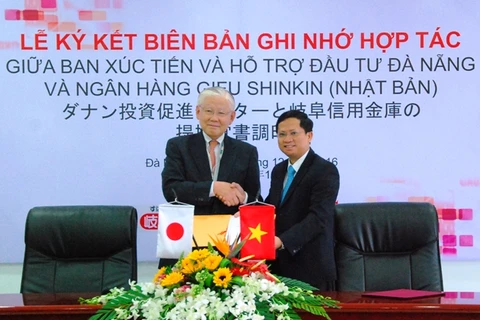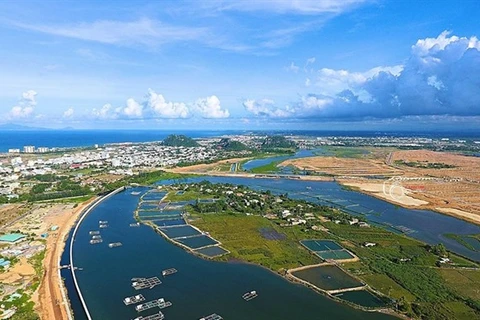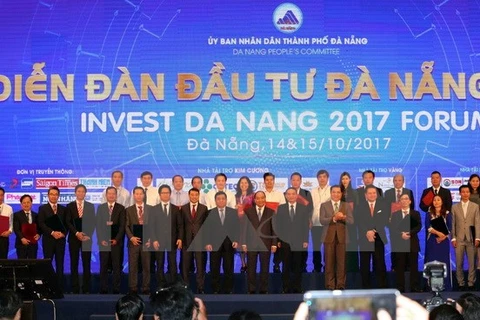Da Nang (VNS/VNA) - The central city of Da Nang aims to accelerate economic growth from 7.68 percent to 12 percent, while more drastic measures and administrative reforms are needed to turn the city into an as a destination to investment and tourism.
Secretary of the city Party Committee Truong Quang Nghia spoke at the Spring Dialogue 2019 on March 1, stating that this year will be a benchmark for the socio-economic Master Plan in 2030.
Despite the existence of 27,000 businesses with total investment of 193 trillion VND (8.5 billion USD), Da Nang contributed just 1.55 percent to the country’s Gross Domestic Product (GDP).
“The city will focus on five key industries, including tourism and service and real estate; sea port and logistics; hi-tech industries and innovation; information technology and digital economy and hi-tech agriculture,” Nghia said at the dialogue.
“Da Nang will dismantle barriers in administrative procedures to support local residents and the business community as well as foreign investors in operating businesses in 2019,” he said.
He said the city would promote transparency and publicity in land access and reduce informal charges in procedures for businesses as well as boost competition and information for all businesses and residents.
Japanese Ambassador to Vietnam, Umeda Kunio, said Da Nang was a popular destination for investors not only from Japan, but from other countries too.
“The city has boosted ties with cities in Japan including Kawasaki, Yokohama, Mitsuke and Mimasaka. Da Nang has inked friendship affiliation agreement with Osaka and Sakai cities in early 2019,” Umeda Kunio said.
He said Da Nang did not have any direct flights to Japan five years ago, but the city now hosted 14 direct air routes from Japan each week.
The Japanese ambassador also said Japan eased visa rules for Vietnamese civil servants and businesses.
“Japan and Da Nang agreed to cooperate in dealing with human resources, and Japan will help Da Nang in training as well as Japanese language education,” he said, adding that 127 Japanese business were operating in Da Nang.
He said Japan planned to open a consulate in the city in early 2020, creating smooth conditions for both Japanese and Vietnamese tourists, businesses and investment.
Japanese language has been taught at some schools following the city’s foreign language teaching programme for 2012-20.
Jonathan Hanh Nguyen, whose company operates a new terminal at Cam Ranh Airport in Khanh Hoa province, urged the city to build a third terminal to ease congestion.
He said Da Nang should design an international standard duty-free zone and recreational area for tourists.
He also suggested the city promote transparency and fair competition in land auctions among businesses as well as publicity in land planning.
Satoru Takizawa, chairman of the Japanese Business Association in Da Nang, said the city should plan and invest in infrastructure projects.
He said Japanese businesses and other FDI enterprises had failed in finding work space and land for factories as well as skilled manpower.
Lawrence Lee, general director of TCIE Vietnam, a member of Malaysia’s Tan Chong Motor Group, said the city had offered strong support to the company in dealing with policy changes in the automobile industry.
He urged other foreign businesses to eye long-term investment in Da Nang and build trusts in the city as a second home.
Huynh Uy Dung, Chairman of Dai Nam Group said his company would invest 10 trillion VND (442 million USD) in helping the city deal with waste water treatment with bio-technology solutions.
Kevin Loebbaka, Chief Operating Officer for Universal Alloy Corporation and President of Universal Alloy Corporation Europe (UAC), said the city and departments had been very helpful in assisting UAC.
“Da Nang and Vietnam have proven to be trusted partners in establishing our investment in the Da Nang Hi-Tech Park. I would recommend to any company seeking to do business in Vietnam. Come to Da Nang to see what opportunities exist in this beautiful, vibrant, high tech city,” Kevin said.
He said UAC, which was established in 1961 as a global manufacturer and supplier of aerospace components, had established long term contracts with all the major aircraft manufacturers such as Boeing, Airbus Embraer and Bombardier.
He said UAC provided highly engineered aircraft parts and assemblies to over 800 companies in North America, Asia, Europe and South America, and the company was proud to establish a manufacturing site in Asia, in the beautiful city of Da Nang.
He said in Vietnam, VietJetAir had purchased 65 Airbus A320 and A321 single aisle aircraft, while Bamboo Airways bought six Airbus single aisle aircraft, and they would commit to 20 Boeing 787 aircraft – the Dream Liner.
He expressed his hope that Vietnam would continue to focus on aerospace manufacturing as the country further leverages offset sales to Vietnamese airlines.
Kevin said: “In Anaheim California, UAC had an exceptionally talented Vietnamese workforce that was highly proficient in math, science, and machining skills. And today we begin UAC in Da Nang with the slogan ‘Flying into the Future’.”
UAC will begin manufacturing over 4,000 different aerospace parts in Da Nang for Boeing’s 787, 777, and 737 aircraft programmes, and it will export these parts to North America, Europe and Asia.
UAC on March 1 also officially launched its 170 million USD Da Nang Sunshine Aerospace components manufacturer project in Da Nang.
At the one-day dialogue, the city also officially granted investment licences to eight projects worth 490 million USD and 11 other feasibility studies projects with an estimate of 3.5 billion USD.
The city also signed an agreement with Sakae Holdings and Subarna Jurong Consultants from Singapore in consultancy on revision of the city’s Master Plan in 2030 at the dialogue. - VNS/VNA
VNA

